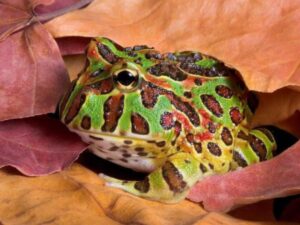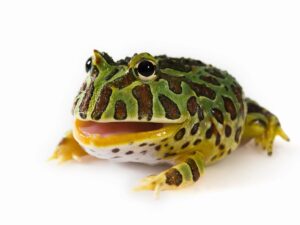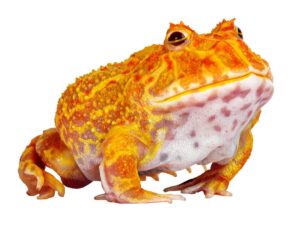🐸 Is a Pacman Frog the Right Pet for You?
Everything You Need to Know Before Bringing One Home
Is a Pacman Frog the Right Pet for You? - At a Glance
Pacman frogs are low-maintenance, fascinating pets ideal for beginners who want a hands-off amphibian. They require a warm, humid tank, live prey, and minimal handling. If you’re okay with a pet that mostly hides and doesn’t cuddle, the Pacman frog could be perfect for you.
The Pacman frog (Ceratophrys spp.) is a popular choice for reptile and amphibian enthusiasts thanks to its unique appearance, simple care routine, and low activity level. But while they’re beginner-friendly, they’re not ideal for everyone.
In this article, you’ll learn:
What makes Pacman frogs unique
Their habitat and diet needs
Pros and cons of ownership
Ideal owner profiles
How to decide if it’s the right match for your lifestyle
What Makes Pacman Frogs Unique?
Pacman frogs are known for:
Their round, horned appearance and large mouths
A sedentary, ambush-predator lifestyle
Eating prey whole, including insects and occasionally pinky mice
Low movement and minimal handling needs
They’re entertaining in a different way—more like a living display animal than a companion.
👉 Pacman Frog Behavior: What’s Normal and What’s Not
👉 What Do Pacman Frogs Eat? Complete Feeding Guide
👉 Pacman Frog Lifespan: How Long Do They Live?
Basic Care Requirements
If you’re considering one, here’s what you’ll need:
| Requirement | Details |
|---|---|
| Enclosure | 10–20 gallon tank with screen lid |
| Temperature | 75–85°F with regulated heating |
| Humidity | 60–80%, maintained with misting and moist substrate |
| Substrate | Coco fiber or moss (deep enough for burrowing) |
| Diet | Live insects, occasional vertebrate prey |
| Water | Shallow dish of dechlorinated water |
Pros of Owning a Pacman Frog
| Benefit | Why It Matters |
|---|---|
| Low maintenance | Doesn’t require daily interaction or walking |
| Small space requirement | Great for apartments or desks |
| Quiet and odorless | No noise, no strong smells with good hygiene |
| Long lifespan | Lives 6–10 years with proper care |
| Captivating appearance | Horned head and wide mouth give them charm |
Cons of Owning a Pacman Frog
| Drawback | What You Should Know |
|---|---|
| Not handleable | Handling causes stress; mostly a “look only” pet |
| Live feeding required | Must feed insects, not pellets or veggies |
| Burrowing/hiding | Often out of sight for days or weeks |
| Temperature/humidity control | Needs stable, monitored environment |
| Risk of impaction | Improper substrate or feeding can cause health issues |
Who Is a Pacman Frog Best For?
Pacman frogs are a great match if you:
Want a low-interaction pet
Have basic pet care experience
Can maintain a consistent environment
Are okay with feeding live insects
Enjoy observing rather than handling pets
Want a unique addition to your terrarium collection
They’re perfect for students, working professionals, or apartment dwellers who love exotic animals but don’t want a highly demanding pet.
What to Consider Before Buying
Before bringing one home, ask yourself:
Do I mind feeding live bugs?
Can I monitor temperature and humidity daily?
Am I okay with a pet that may stay buried for long periods?
Do I want a pet I can hold or play with?
Can I commit to 5–10 years of care?
If you’re still unsure, consider visiting a local reptile expo or store to observe one in person first.
Final Thoughts
Pacman frogs are low-maintenance but high-interest pets for the right kind of owner. They’re not ideal for cuddling or display all day, but they thrive in stable environments with minimal interference. If you love unique creatures and can respect their space, a Pacman frog might just be your perfect pet.
FAQ: Is a Pacman Frog Right for Me?
Q: Are Pacman frogs good for kids?
A: They can be, with supervision. These frogs aren’t interactive and shouldn’t be handled, but they’re great teaching tools for responsible care.
Q: Do they get lonely if kept alone?
A: Not at all. Pacman frogs are solitary and prefer being alone. Co-housing is not recommended.
Q: What if I travel a lot?
A: With an automated misting system and a trusted pet-sitter to handle feeding every few days, they’re manageable even for travelers.




